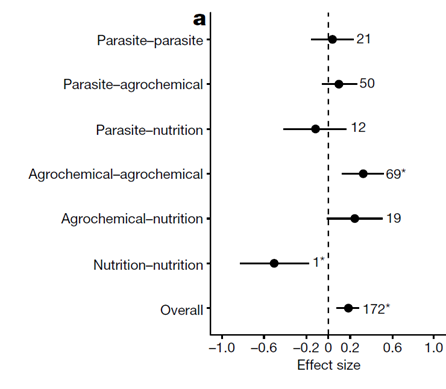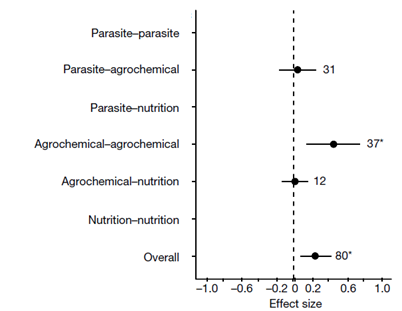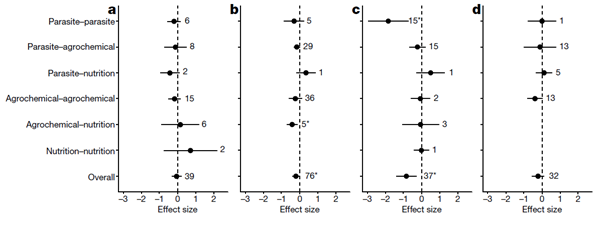
Really happy to present our new paper published in @Nature . We use meta-analysis to show that interactions between agrochemicals, poor nutrition and parasites interact synergistically to increase bee mortality. Start of thread (1/13). nature.com/articles/s4158…
Interactions between environmental stressors contribute to bee declines. We analysed whether (i) these interactions have an overall synergistic effect on bees and (ii) determine if certain stressor groups (e.g. pesticides) are more likely to induce synergism than others.
We conducted a meta-analysis on data from 90 studies published over two decades. This allowed us to compare if observed interaction effects were similar (additive), worse (synergistic), or better (antagonistic), than the predicted impact of combining two individual stressors.
We found an overall synergistic interaction between pesticides, parasites, and poor nutrition on bee mortality. Sub-set analysis however revealed that the majority of synergistic interactions occurred when bees were exposed to multiple agrochemicals. 

To ensure that the impacts of agrochemicals were ‘field relevant’ we re-ran the analysis when only studies that exposed bees to low concentrations of the pesticides were included. We found the exact same result. 

Next, we looked at the interaction effects on bee fitness, behaviour, parasite intensity and immune response. We found no synergistic interactions, but antagonistic effects on bee behaviour and parasite intensity.
The mechanism driving synergistic effects on bee mortality are therefore currently unclear. (Figure a = fitness proxy, b = behaviour, c = parasite intensity & d = immune response 

We also highlight key literature gaps. E.g., interaction effects between poor nutrition and other stressors. My colleague @albertolinguad1 recently showed that poor nutrition can exacerbate the impacts of pesticides tinyurl.com/2dm2smb2
Finally, our research confirms that by failing to assess how agrochemicals interact with one another, current environmental risk assessments will underestimate the impact of pesticides and other chemicals on bees
We suggest that (i) interactions effects between agrochemicals, and other commonly occurring stressors, should be a mandatory requirement in risk assessment and (ii) that post-licencing observations, similar to those conducted with pharmaceuticals, should also be carried out.
A failure to modify both agrochemical regulation, and intensive agriculture will result in a continued decline in bees, and pollinators more broadly.
This work was a big collaboration between me, @EmilyJBailes @CallumD_Martin @thomasroliveruk @KorichevaLab @ElliLeadbeater1 & @sphaerularia
We are also grateful to all 5 reviewers who genuinely really helped improve our manuscript, all authors who made raw data available to us, or responded to our nagging questions and of course the funders @poshbee_eu
• • •
Missing some Tweet in this thread? You can try to
force a refresh



